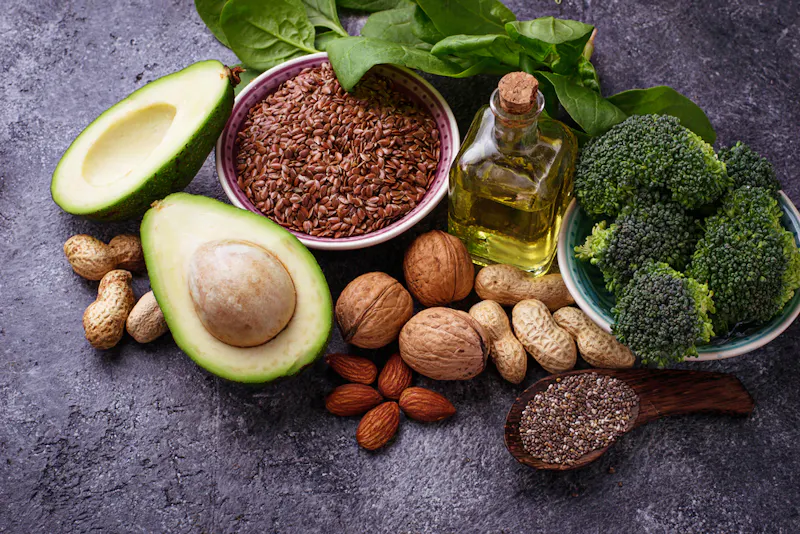Is the omega-6 to omega-3 ratio important?



Omega-6 and omega-3 are part of the polyunsaturated fats group. These are essential fatty acids because your body can’t create enough of them unless you consume food that provides these nutrients. The good news is that you can get omega-3 and omega-6 from your diet or by taking supplements.
What is omega-3?
Omega-3 is a fatty acid that plays a vital role in your heart, brain, and eye health. It’s also essential for promoting a healthy brain and eye development in a foetus (an unborn baby) if you’re pregnant.
Certain omega-3 fatty acids also form a part of cell membranes, have an anti-inflammatory effect and play an essential role in fertility, mood, memory, and cognition.
The most active forms of omega-3 include 2 fatty acids:
- docosahexaenoic acid (DHA)
- eicosapentaenoic acid (EPA)
Food sources of DHA and EPA include:
- salmon
- mackerel
- sardines
- trout
- herring
- kippers
- crab
- seaweed
450mg EPA and 450mg DHA a day is typically the recommended adult dose — children need a lower age-appropriate amount.
If you follow a vegetarian or vegan diet, you can get algae-based omega-3 in certain plant-based foods in the form of alpha-linolenic acid (ALA).
But only a small amount of ALA is converted into EPA and DHA.
Previous studies show that around 0-9% of ALA is converted into DHA, while 8-21% is converted into EPA. But these studies were small, and there are differences between men and women.
Good sources of ALA include:
- walnuts
- flaxseeds
- chia seeds
- rapeseed oil
- soybean oil
- edamame beans
- tofu
- tempeh
You might not get enough omega-3 if you follow a vegan or vegetarian diet or if you don't eat a lot of fish. But you can prevent and treat a deficiency with our premium, vegan omega-3 supplements. They're made from algae, the same source fish get theirs from.
And you can check how your levels change over time by using an omega-3 and 6 blood test in the comfort of your own home.
What is omega-6?
Omega-6 fatty acids support a variety of functions in your body, like:
- cell membrane structure
- growth and repair
- maintaining healthy cholesterol levels
- improving insulin sensitivity
But omega-6 also has a bad rap for being proinflammatory and bad for your heart health. This is because a type of omega-6 fatty acid called linoleic acid (LA) coverts into a fatty acid called arachidonic acid (AA).
AA can be used to create several molecules in your body. Some of these molecules promote inflammation and stiffen blood vessels, while some are anti-inflammatory, heart-healthy molecules.
Good omega-6 food sources include:
- corn oil
- sunflower oil
- safflower oil
- sesame oil
- soybean oil
- walnut oil
Mayonnaise, spreads, baked and fried foods also contain oils high in omega-6.
Is the omega-6 to omega-3 ratio important?
There’s some concern that LA is converted to AA, which might increase inflammation. It’s thought that too much LA might lead to lower levels of omega-3 in your body.
Some studies show that heart disease rates have increased in line with increased intakes of omega-6 over the years.
There’s no agreement on the ideal omega-6 to 3 ratios. Some scientists recommend a ratio of 2.5:1 to 11:1 (omega-6:omega-3), but the current western diet is closer to 16:1.
But in 2009, the American Heart Association reported that consuming at least 5-10% of energy from omega-6 reduces your risk of heart disease. And reducing your omega-6 might increase your heart disease risk. Evidence suggests that consuming omega-6 leads to an anti-inflammatory and cholesterol-lowering effect.
Similarly, getting enough omega-6 has been linked with a lower risk of heart disease and fewer heart attacks.
Another argument against focusing on the omega-6 to 3 ratios is that you could still be deficient in omega-3 and omega-6 while achieving a normal or healthy ratio.
Most people consume enough omega-6 but not enough omega-3. So, many scientific bodies advise increasing your omega-3 intake to the recommended levels rather than reducing your omega-6 intake or focusing on omega-6 to 3 ratios.
How much omega-3 should you eat a day?
You should eat at least 1 portion of oily fish a week — like salmon or mackerel.
A portion of fish for an adult is 140g of fresh fish or 1 small tin of fish.
Girls, women who breastfeed, and those who are pregnant or trying to conceive shouldn’t eat more than 2 portions of oily fish a week. This is due to pollutants that can build up in oily fish and harm an unborn baby.
If you don’t eat fish or follow a vegan diet, you should eat plant-based sources of omega-3, fortified foods and consider an omega-3 supplement rather than a fish liver oil supplement.
It’s better to get omega-3 from your diet where possible, but supplements can be helpful for some people. It’s always best to get advice from a registered dietitian about this.
Other considerations with omega-3 supplements include:
- ensuring your vitamin A content is no more than 1.5mg a day
- avoiding vitamin A in any supplements you might take if you’re pregnant
EFSA Panel on Dietetic Products, Nutrition and Allergies (NDA). (2010). Scientific Opinion on the substantiation of health claims related to docosahexaenoic acid (DHA) and maintenance of normal (fasting) blood concentrations of triglycerides (ID 533, 691, 3150), protection of blood lipids from oxidative damage (ID 630), contribution to the maintenance or achievement of a normal body weight (ID 629), brain, eye and nerve development (ID 627, 689, 704, 742, 3148, 3151), maintenance of normal brain function (ID 565, 626, 631, 689, 690, 704, 742, 3148, 3151), maintenance of .... EFSA Journal, 8(10), 1734. [accessed November 2021 via: https://efsa.onlinelibrary.wiley.com/doi/pdf/10.2903/j.efsa.2011.2078]
Coletta, J. M., Bell, S. J., & Roman, A. S. (2010). Omega-3 fatty acids and pregnancy. Reviews in obstetrics and gynecology, 3(4), 163. [accessed November 2021 via: https://www.ncbi.nlm.nih.gov/pmc/articles/PMC3046737/]
NIH Website (2021) “Omega-3 Fatty Acids” [accessed November 2021 via: https://ods.od.nih.gov/factsheets/Omega3FattyAcids-HealthProfessional/]
Simopoulos, A. P. (2002). Omega-3 fatty acids in inflammation and autoimmune diseases. Journal of the American College of nutrition, 21(6), 495-505. [accessed November 2021 via: https://pubmed.ncbi.nlm.nih.gov/12480795/]
Liao, Y., Xie, B., Zhang, H., He, Q., Guo, L., Subramaniapillai, M., ... & Mclntyer, R. S. (2019). Efficacy of omega-3 PUFAs in depression: a meta-analysis. Translational psychiatry, 9(1), 1-9. [accessed November 2021 via: https://www.nature.com/articles/s41398-019-0515-5]
Witte, A. V., Kerti, L., Hermannstädter, H. M., Fiebach, J. B., Schreiber, S. J., Schuchardt, J. P., ... & Flöel, A. (2014). Long-chain omega-3 fatty acids improve brain function and structure in older adults. Cerebral cortex, 24(11), 3059-3068. [accessed November 2021 via: https://pubmed.ncbi.nlm.nih.gov/23796946/]
Burdge, G. C., Jones, A. E., & Wootton, S. A. (2002). Eicosapentaenoic and docosapentaenoic acids are the principal products of α-linolenic acid metabolism in young men. British Journal of Nutrition, 88(4), 355-363. [accessed November 2021 via: https://pubmed.ncbi.nlm.nih.gov/12323085/]
Burdge, G. C., & Wootton, S. A. (2002). Conversion of α-linolenic acid to eicosapentaenoic, docosapentaenoic and docosahexaenoic acids in young women. British Journal of Nutrition, 88(4), 411-420. [accessed November 2021 via: https://pubmed.ncbi.nlm.nih.gov/12323090/]
Harris, W. S., Mozaffarian, D., Rimm, E., Kris-Etherton, P., Rudel, L. L., Appel, L. J., ... & Sacks, F. (2009). Omega-6 fatty acids and risk for cardiovascular disease: a science advisory from the American Heart Association Nutrition Subcommittee of the Council on Nutrition, Physical Activity, and Metabolism; Council on Cardiovascular Nursing; and Council on Epidemiology and Prevention. Circulation, 119(6), 902-907. https://www.ahajournals.org/doi/full/10.1161/circulationaha.108.191627]
Foster, R., Williamson, C. S., & Lunn, J. (2009). BRIEFING PAPER: Culinary oils and their health effects. Nutrition Bulletin, 34(1), 4-47. [accessed November 2021 via: https://onlinelibrary.wiley.com/doi/full/10.1111/j.1467-3010.2008.01738.x]
EFSA Panel on Dietetic Products, Nutrition, and Allergies (NDA). (2010). Scientific opinion on dietary reference values for fats, including saturated fatty acids, polyunsaturated fatty acids, monounsaturated fatty acids, trans fatty acids, and cholesterol. EFSA Journal, 8(3), 1461. [accessed November 2021 via: https://efsa.onlinelibrary.wiley.com/doi/10.2903/j.efsa.2010.1461]
BDA Website (2021) “Omega-3: Food Fact Sheet” [accessed November 2021 via: https://www.bda.uk.com/resource/omega-3.html]
NHS Website (2018) “Fish and shellfish” [accessed November 2021 via: https://www.nhs.uk/live-well/eat-well/fish-and-shellfish-nutrition/]